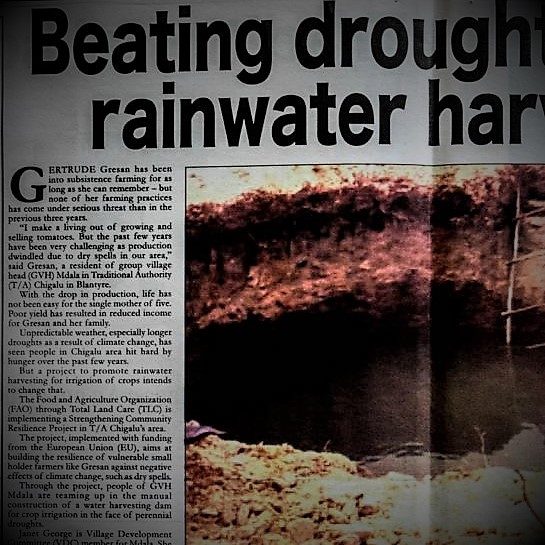
Gertrude Gresan has been into subsistence farming for as long as she can remember – but none of her farming practices has come under serious threat than in the previous three years.
“I make a living out of growing and selling tomatoes. But the past few years have been very challenging as production dwindled due to dry spells in our area,” said Gresan, a resident of group village head (GVH) Mdala in Traditional Authority (T/A) Chigalu in Blantyre.
With the drop in production, life has not been easy for the single mother of five. Poor yield has resulted in reduced income for Gresan and her family.
Unpredictable weather, especially longer droughts as a result of climate change, has seen people in Chigalu area hit hard by hunger over the past few years.
But a project to promote rainwater harvesting for irrigation of crops intends to change that.
The Food and Agriculture Organization (FAO) through Total Land Care (TLC) is implementing a Strengthening Community Resilience Project in T/A Chigalu’s area.
The project, implemented with funding from the European Union (EU), aims at building the resilience of vulnerable small holder farmers like Gresan against negative effects of climate change, such as dry spells.
Through the project, people of GVH Mdala are teaming up in the manual construction of a water harvesting dam for crop irrigation in the face of perennial droughts.
Janet George is Village Development Committee (VDC) member for Mdala. She said the coming together of all villagers in the project is a clear indication that the communities have had enough of dry spells and want a permanent solution to their problem.
“We have encountered so many challenges due to dry spells that have frequently hit our area in the past years. When officials from Total Land Care presented us with this idea of harvesting rainwater, we agreed to give it a try,” George said.
Looking at the pace and the way the dam is being constructed, it clearly shows that the people of Mdala are committed to beating dry spells through irrigation farming facilitated by this project.
The dam, which is four meters deep, is expected to harvest rain water through a nearby stream and supply the water to over two hectares of land with over 60 farming households as beneficiaries.
Similarly, communities in group village head Malizani in Senior Chief Kuntaja in the same district of Blantyre are not just sitting idle in the wake of the adverse environmental conditions.
Unlike the communities in GVH Mdala, who are constructing a dam to harvest rainwater, the communities at GVH Malizani have dug two seepage wells which provide them with enough water to irrigate their crops during dry spells.
Furthermore, their technology for collecting water is not wholly manual. They use a 240 watts solar panel to pump water from the seepage wells to nearby fields.
Lovemore Lundu is one of the farmers benefiting from the wells. He said the idea of sinking the wells was arrived at after experiencing challenges associated with unreliable rainfall in the area.
“We are using the knowledge and skills gained from our extension workers in the adoption of irrigation farming.
“Currently, everything is going on well. We are able to grow different crops all year round, which we later sell as a group and fend for our families,” Lundu said.
The farmers at GHV Malizani were also linked to Chileka Horticulture by TLC where they sell some of their farm produce.
TLC Field Coordinator for Chigalu area, Chrispo Lazaro, said it is encouraging that farmers are using the expertise they were equipped with in adapting to the negative effects of climate change.
Lazaro said with the world grappling with climate change that result in natural disasters such as dry spells and erratic rainfall patterns, water harvesting is a very effective way to sustain farming.
“People should adopt these farming technologies especially in times like these where climate change has brought about adverse weather conditions. This is one alternative way for people to cushion their farming practices from these negative effects,” he said.
Lazaro further said the huge positive response from farmers towards these techniques is a clear indication that the technologies really work.
Triza Lipato is Agricultural Extension Development Officer for Chigalu. She said time has come for Malawians to adopt new technologies such as rainwater harvesting which is being advocated by the FAO project.
“I am hopeful that by the end of the five-year project, the livelihoods of people in the two group villages of Mdala and Malizani will transform for the better and that other areas should replicate this initiative,” Lipato said.
Conventional wisdom has it that when the bush is on fire, a chameleon learns how to run fast. It underscores the nature of human and animal behavior in adapting to changes in the environment.
It is pleasing to note that the people of Chigalu in Blantyre are just doing that by beating the adverse effects of climate through rainwater harvesting.
